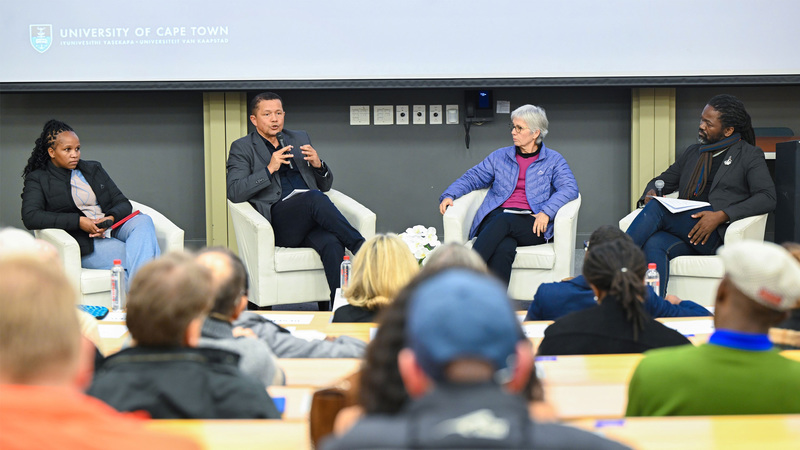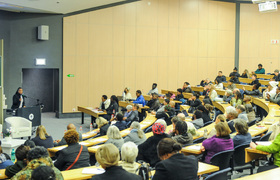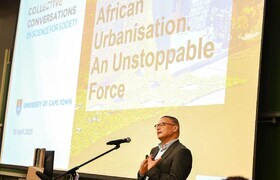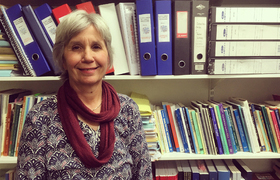Reimagining health systems for wellbeing – a Collective Conversation
18 July 2025 | Story Ayanda Mthethwa. Photos Lerato Maduna. Video Production Team Ruairi Abrahams and Nomfundo Xolo. Read time 9 min.The COVID-19 pandemic making it clear that health systems must be resilient, inclusive, and geared towards prevention and preparedness – not just emergency response. What then would it take to build a health system that truly promotes wellbeing, rather than only treating disease in South Africa?
This central question shaped the second edition of the Collective Conversations: On Science for Society, a dialogue series hosted by the University of Cape Town (UCT) and convened by the Vice-Chancellor, Professor Mosa Moshabela. The series aims to bring together voices from across disciplines and sectors to engage with pressing societal challenges – particularly those pertinent to the African continent.
Themed “Health systems for health and wellbeing”, the conversation explored what it would mean to have a more holistic take on the role that health systems play, not just in treating illness, but in promoting physical, mental and social well-being across the life course. It called for a shift from a disease-centred approach to a people-centred one.
A diverse and vibrant group of stakeholders – researchers, civil society, healthcare workers and community workers, all eager to shift the hierarchical paradigm of the healthcare system in the Western Cape (WC), convened at the New Lecture Theatre on upper campus.
“There’s also evidence that health systems can help build public trust in government.”
In his opening remarks, Professor Moshabela invited the audience to consider alternative perspectives:
“Think of health as an intersection where many pathways come together. Many of us can relate to issues of health, not just as scientists but also in our households, communities, amongst our friends and families – we can relate. We must look at health and wellness in that broader ecosystem.”
The crisis of trust in health systems
The VC highlighted the importance of trust as foundational for effective health systems. Without trust, inclusivity, accountability and equitable access become difficult to achieve.
Moshabela reflected on the multi-layered erosion of trust: “We’re experiencing a crisis of trust in terms of the mistrust of science, decision makers, policy makers, leaders, global partners … We have a serious problem of misinformation – people don’t know what information to trust and how to appraise it.”
On the crisis of trust, Professor Lucy Gilson, the founding head of the Health Policy and Systems Division in the School of Public Health at UCT, said because health systems are social institutions embedded in every society their impact extends beyond health. They play a role in tackling inequality, advancing equity, and even building trust between citizens and governments.
“There’s also evidence that health systems can help build public trust in government,” she said, “and such trust is in turn a critical resource in promoting health and wellness.”
Dr Keith Cloete, head of Health and Wellness in the WC government, agreed: “We have a unique opportunity with civil society and academia to walk this path together, but these networks can only work if there’s trust,” he said.
The role and importance of health systems
Through powerful provocations Professor Gilson outlined that health systems matter not only because they are necessary for delivering healthcare at scale in response to population-wide illnesses like HIV/AIDS and COVID-19, but also because they are platforms for broader action.
“Health systems matter because health challenges are themselves complex.”
To do this effectively, Gilson explained, health systems must harness the efforts of a wide range of actors. That although government health departments are legitimate and mandated stewards of health, they aren’t stewards of healthcare. The role of these systems should go beyond managing facilities and services as they are central to achieving health and wellbeing.
“Health systems matter because health challenges are themselves complex,” she said. “Actions to address them must go beyond healthcare. Health challenges are caused by multiple social determinants, economic, commercial, political, historical and more.”
However, Gilson noted, most health systems around the world remain dominated by curative care – particularly hospital-based care – and are often fragmented. She further pointed to population-level drivers like climate and environmental change, which are adding urgency and volatility to already complex challenges.
Challenging healthcare paradigms
Dr Cloete called for a fundamental rethink of how health systems are structured, by moving beyond a reactive, disease-focused model, which he argued, neglects the human and social aspects of health. “We need to challenge the paradigm that this entire system has been set up to respond to disease. [Instead it should be about] how to move from the challenge of disease to dealing with people,” he said.
The consequences of a system built around disease-specific responses, Cloete noted, were exacerbated by the withdrawal of funding from the United States President’s Emergency Plan for AIDS Relief (PEPFAR). While PEPFAR played a critical role in scaling up HIV care over the past two decades, its narrow focus on a single disease reflects the limitations of a vertical, programme-based model.
Cloete explained that the WC government is working to reorient its health strategy around a life course approach, one that considers an individual’s entire lifespan together with the social and environmental contexts they live in.
“The life course frees us from old paradigms, including bringing in the social and human dimensions to the person. Suddenly we move from the [disease] inside the body to the person and the context within which they find themselves.”
“The infrastructure is failing us and we need to talk about that. In some facilities, counsellors are still sharing counselling rooms.”
Asoze s’phele amandla – quality healthcare now
Amelia Mfiki, a respected civil society leader and co-chair of the Western Cape Provincial Council on AIDS & TB (PCAT) with Premier Alan Winde, opened with a poignant reminder of the resilience of communities fighting for health justice. Bursting into song: “Asoze s’phele amandla” – “We’ll never lose strength” – a refrain that speaks to civil society’s unwavering commitment to strengthening the health system and holding those in power accountable.
Mfiki painted a stark picture of the reality faced by many South Africans when accessing public services. “We know that we have a right to quality healthcare. But what we see in our facilities is something else. This applies not only to health but across most government departments in South Africa.”
She described the arduous ordeal many citizens endure just to access basic services. “You either need to queue for 12 hours, and by the time you reach the front, you’re often told the systems aren’t working.”
For Mfiki, these failures reflect a deeper issue, the disconnect between available resources and infrastructure versus the lived experience. “We also know that populations are growing, not just in the Western Cape, but across the country. But what systems are in place to ensure that this anticipated growth is matched by the services our communities need?”
Referring specifically to Khayelitsha and Mitchells Plain, she pointed out that many public hospitals were designed to serve far smaller populations than they do today. “We’re facing growing burdens of mental health conditions, diabetes, cancer and other non-communicable diseases. What systems do we have in place to respond to these challenges?
“Infrastructure is failing us and we need to talk about that. In some facilities, counsellors are still sharing counselling rooms – places where patients are expected to speak openly about their health. Is that really the quality of healthcare we’re aiming for?”
From lip service to action
The evening tapped into various tensions including audience members’ frustration at cyclical conversations that don’t move the needle. At a country able to mobilise for the COVID pandemic but not doing the same for other long-standing pandemics which have killed millions. At a health system that often neglects equal access to healthcare for the LGBTQIA+ community. At funding not being directed where it’s needed.
Looking ahead, Gilson stressed the need for collaboration across sectors and levels: “Tackling the root causes of problems requires a wide array of actions involving working with and within communities, as well as with civil society organisations, other social actors, private sector and an array of government departments.”
 This work is licensed under a Creative Commons Attribution-NoDerivatives 4.0 International License.
This work is licensed under a Creative Commons Attribution-NoDerivatives 4.0 International License.
Please view the republishing articles page for more information.























